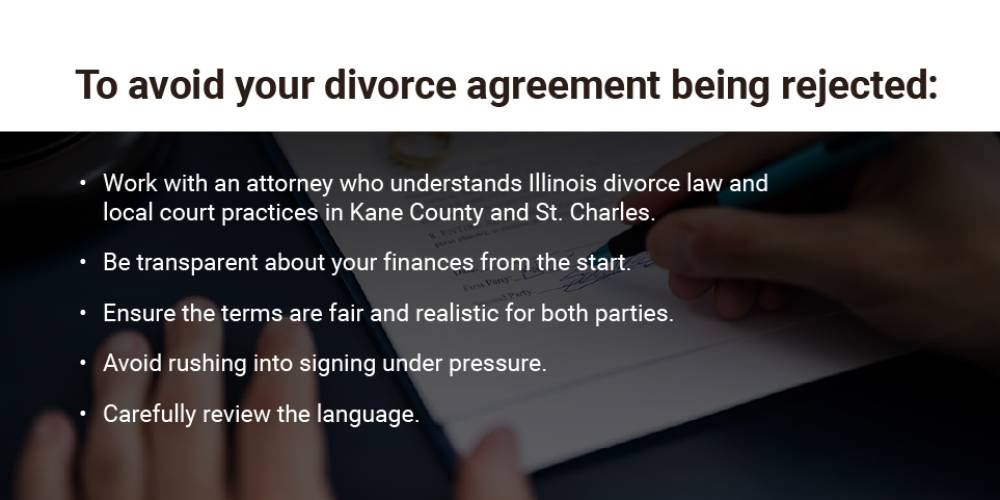Update: Seven Reasons Your Divorce Agreement Can Be Rejected in Court
 Negotiating the terms of your divorce can be an exhausting process. By the time you and your spouse have agreed on property division, parenting time, and support, you may feel relieved and ready to move forward with your life. But even if both of you sign the agreement, the court still has the final say.
Negotiating the terms of your divorce can be an exhausting process. By the time you and your spouse have agreed on property division, parenting time, and support, you may feel relieved and ready to move forward with your life. But even if both of you sign the agreement, the court still has the final say.
In Illinois, a divorce agreement is a binding contract between spouses, but it must meet specific legal standards before a judge will approve it. If the court finds that your agreement violates the law, is fundamentally unfair, or was reached improperly, it can be rejected. That could send you back to the negotiating table and delay your divorce.
As of August 2025, Illinois courts still review divorce settlement agreements under the Illinois Marriage and Dissolution of Marriage Act (750 ILCS 5). The judge’s role is to ensure the agreement complies with the law and serves the best interests of any children involved. At Goostree Law Group, our job is to make sure your settlement is strong and will be approved before it even reaches the judge. Here are seven common reasons an agreement can be denied, and how to avoid them. Call our Kane County, IL divorce attorneys to learn more.
Seven of the Most Common Reasons Divorce Agreements Are Rejected in Illinois Family Courts
Illegality
The court will reject any part of a divorce agreement that violates Illinois law. This includes provisions that attempt to:
-
Waive a parent’s legal obligation to pay child support
-
Reduce or eliminate parenting time in a way that harms the child’s best interests
-
Divide assets in a manner that defrauds creditors or other third parties
For example, parents cannot privately agree that neither will pay child support even if they believe it is fair. Child support is considered the child’s right, and the court will ensure it is calculated and ordered according to Illinois guidelines unless there is a good reason to do otherwise.
Unconscionability
A divorce agreement must be equitable under Illinois law. If a judge finds the terms are one-sided or leave one spouse at a serious financial disadvantage, the judge may reject the settlement.
This most often happens with property division or spousal maintenance (alimony). Illinois uses equitable distribution rather than a strict 50/50 split, but both spouses should leave the marriage with a fair share of marital assets and a reasonable standard of living.
If an agreement gives one spouse nearly all the valuable property while the other assumes most of the debt, the court is likely to intervene.
Nondisclosure of Assets
Full financial disclosure is a legal requirement. Each spouse must list all income, accounts, real estate, investments, retirement funds, and other assets, plus debts, in a sworn financial affidavit. If a spouse hides assets to try to get ahead, and that is discovered, the court can invalidate the agreement.
Nondisclosure not only delays the divorce but can also result in penalties or an unequal division of property to compensate the other spouse. Forensic accountants can trace hidden accounts or unusual transfers, and digital records make secrecy difficult. Transparency from the start is the safest approach.
Coercion
Agreements reached through threats, intimidation, or blackmail are not enforceable. Coercion is a direct form of duress; for example, threatening to harm someone, ruin their reputation, or withhold necessary funds unless they sign.
If you can prove your spouse coerced you into signing, the court will reject the agreement. Having your own legal representation throughout the process is one of the best protections against coercion.
Undue Influence
Undue influence is more subtle than coercion. It happens when one spouse takes advantage of a position of power to pressure the other into an unfair agreement. This could occur if one spouse controls all marital finances and withholds access to money, preventing the other spouse from hiring an attorney.
It can also happen when one spouse manipulates the other’s emotions. For example, one spouse might suggest that signing quickly is "for the good of the children" when the terms are clearly unfavorable to the other spouse. Judges look closely at the circumstances under which agreements are reached to ensure both parties acted voluntarily.
Mistakes or Ambiguities
Even if the terms are legal and fair, errors in the drafting process can cause problems. If your agreement contains unclear language, contradictory terms, or missing details, the judge may require revisions before approval.
For example, if your parenting time schedule is vague ("weekends" instead of specific days and times) or your property division omits how certain debts will be paid, the court may refuse to finalize the divorce until those gaps are addressed. Precise, consistent wording is essential to avoid future disputes.
Incapacity
Both parties must have the mental capacity to understand what they are signing. If a spouse was under the influence of drugs or alcohol, suffering from a serious illness, or otherwise unable to comprehend the agreement at the time of signing, the court may reject it.
Capacity is also an issue if one spouse has a cognitive impairment and no legal guardian or advocate was involved. Judges must ensure both parties participated knowingly and willingly.
Preventing Court Rejection of Your Divorce Agreement
A rejected agreement means more delays, more legal costs, and more stress. To improve the chances of approval:
-
Work with an attorney who understands Illinois divorce law and local court practices in Kane County and St. Charles.
-
Be transparent about your finances from the start.
-
Ensure the terms are fair and realistic for both parties.
-
Avoid rushing into signing under pressure.
-
Carefully review the language.

When you have a lawyer writing and reviewing your settlement, you greatly reduce the risk of mistakes, omissions, or unenforceable terms.
Contact a St. Charles, IL Divorce Settlement Lawyer
If you are negotiating a divorce agreement, do not risk having it rejected in court. Contact a Kane County, IL divorce attorney at Goostree Law Group by calling 630-584-4800 to schedule your free consultation. With over 20 years of experience helping families resolve complex family law issues, our team can guide you through every step and ensure your agreement meets all legal requirements.
A divorce settlement is one of the most important agreements you will ever sign. Once approved, it is binding. Modifying it later can be difficult. Knowing this, we will work hard to ensure your agreement follows Illinois law, protects your interests, and anticipates the future. With our professional guidance, you can finalize your divorce with confidence that your agreement will stand up in court and protect your future.












